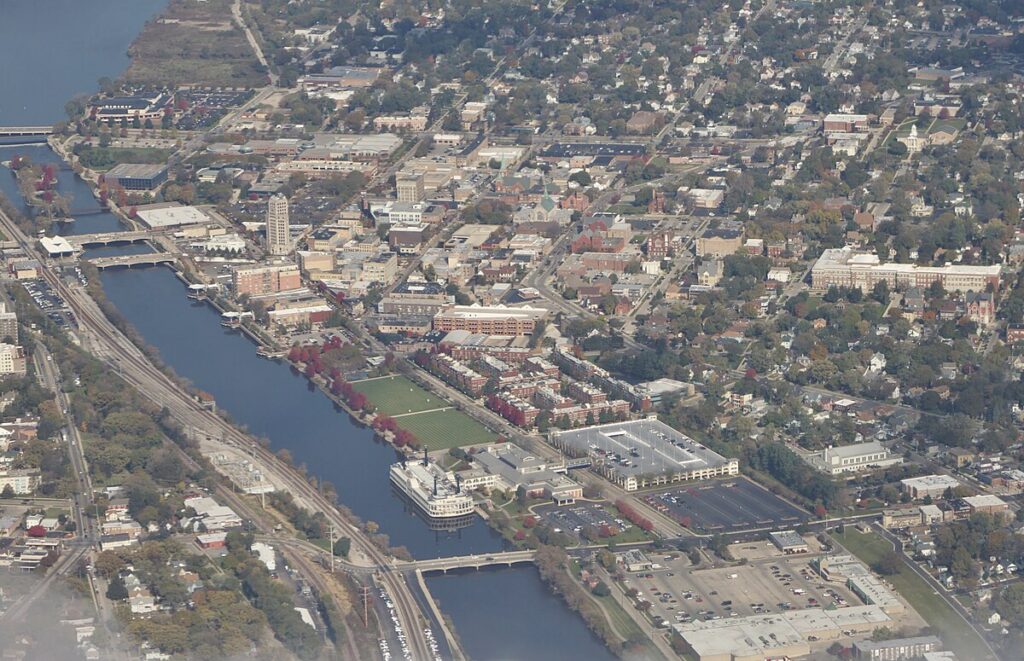
Moving to Elgin, Illinois: A Comprehensive Relocation Guide
Considering moving to Elgin, Illinois? This diverse Fox Valley city offers affordable living, riverfront location, and convenient access. With approximately 114,000 residents in 2025, Elgin combines working-class character with historic downtown and Northwest Chicagoland’s second-largest city.
Demographic Profile to Consider If Moving to Elgin:
Elgin’s 2025 population is approximately 114,000 residents across Kane and Cook counties, making it the Northwest suburbs’ second-largest city. The median age is around 34 years, with diverse working families, Hispanic residents, and young professionals. The population is approximately 47% Hispanic, 42% White, 7% Black or African American, 5% Asian. Elgin features historic downtown along the Fox River, diverse neighborhoods, Grand Victoria Casino, and serves as a Fox Valley hub. The city attracts diverse families seeking affordability, Hispanic residents, and those wanting Northwest suburbs access with lower costs. Elgin appeals to working-class to middle-class residents prioritizing value. The community balances historic character with diversity and growth. Find trusted local services for moving, living, and working in Elgin.Elgin Relocation Directory
Cost of Living to Consider If Moving to Elgin:
Elgin offers exceptional affordability for the Northwest suburbs. Median home values range from $250,000 to $340,000 in 2025, significantly lower than many Chicagoland suburbs while providing metropolitan access. The median household income is approximately $70,000. Rental properties average $1,300 to $1,800 monthly. Illinois’ state income tax is flat 4.95%. Property taxes vary by area. Overall cost of living is very competitive, making Elgin highly attractive for first-time buyers, working families, and those seeking Northwest suburbs affordability. The city provides tremendous value with Chicago accessibility. Housing costs create exceptional accessibility for diverse income levels.
Economy and Job Market:
Elgin’s economy includes manufacturing, healthcare, casino gaming, and retail. Major employers include Advocate Sherman Hospital, Grand Victoria Casino, School District U-46, manufacturing facilities, and retail centers. Many residents commute to Chicago or work throughout the Northwest suburbs. The broader Chicagoland economy offers vast opportunities. Typical commute times to Chicago range 55-75 minutes via Metra. The diverse economy provides opportunities across sectors. Many residents work in manufacturing, healthcare, gaming, services, and trades.
Education:
School District U-46 (Elgin Area School District) serves most Elgin students with schools including Elgin High School, Larkin High School, and South Elgin High School. School quality varies requiring family research. Judson University and Elgin Community College provide higher education. The educational infrastructure serves the large, diverse population with bilingual programs supporting Hispanic students.
Recreation and Lifestyle:
Elgin offers a revitalized historic downtown along the Fox River with restaurants, Grand Victoria Casino providing gaming and entertainment, the Elgin Public Museum, and Hemmens Cultural Center presenting performances. The Fox River Trail provides paved recreation paths. Residents enjoy parks including Lords Park with zoo, Wing Park Golf Course, and diverse dining reflecting the multicultural population. The lifestyle emphasizes affordable family living, diverse culture, riverfront recreation, and Northwest suburbs accessibility. The four-season climate enables varied activities. The community values diversity, affordability, downtown revitalization, and family atmosphere. Living in Elgin means choosing affordability, embracing working-class and Hispanic character, and accepting longer commutes while enjoying Northwest suburbs access and exceptional value with Fox River providing recreation and historic downtown creating character.
Healthcare and Services:
Elgin residents access comprehensive healthcare through Advocate Sherman Hospital, Northwestern Medicine facilities, and medical offices throughout the Fox Valley. The regional healthcare infrastructure provides quality medical care.
Transportation:
Elgin is accessed via Interstate 90 (Jane Addams Memorial Tollway), U.S. Route 20, Illinois Route 25, and various corridors. Metra Milwaukee District West Line provides train service to Chicago from multiple Elgin stations. Pace operates suburban bus routes throughout Elgin. Most residents use personal vehicles. Typical commute times to Chicago via Metra are 60-75 minutes, by car 55-85 minutes depending on traffic.
Conclusion:
Moving to Elgin in 2025 offers affordable Fox Valley living with diverse community, riverfront character, and Northwest suburbs access. The city’s combination of low housing costs, historic downtown, and diversity makes it ideal for working families, first-time buyers, and diverse residents seeking Northwest Chicagoland’s most affordable large city where value meets accessibility and diverse culture defines Fox Valley’s second city.

